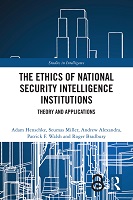The Ethics of National Security Intelligence Institutions
Proposal review
Theory and Applications
Author(s)
Henschke, Adam
Miller, Seumas
Alexandra, Andrew
Walsh, Patrick F.
Bradbury, Roger
Language
EnglishAbstract
This book explores the ethics of national security intelligence institutions operating in contemporary liberal democracies.
Intelligence collection by agencies such as the CIA, MI6, and Mossad involves practices that are apparently inconsistent with the principles of ordinary morality – practices such as lying, spying, manipulation, and covert action. However, in the defence of national security, such practices may not only be morally permissible, but may also under some circumstances be morally obligatory. One approach to the ethics of national security intelligence activity has been to draw from the just war tradition (so-called ‘just intelligence theory’). This book identifies significant limitations of this approach and offers a new, institutionally based, teleological normative framework. In doing so, it revises some familiar principles designed for application to kinetic wars, such as necessity and proportionality, and invokes some additional ones, such as reciprocity and trust. It goes on to explore the applications of this framework and a revised set of principles for national security intelligence institutions and practices in contemporary and emerging political and technological settings.
This book will be of much interest to students of intelligence studies, ethics, security studies and International Relations.
Keywords
ethical institutions;best practice;intelligence services;new technologies;just war modelDOI
10.4324/9781003106449ISBN
9781003106449, 9781040022023, 9780367617561, 9781040021958Publisher
Taylor & FrancisPublisher website
https://taylorandfrancis.com/Publication date and place
2024Grantor
Imprint
RoutledgeSeries
Studies in Intelligence,Classification
Politics and government
Warfare and defence
Peace studies and conflict resolution
Ethics and moral philosophy
Cognition and cognitive psychology


 Download
Download